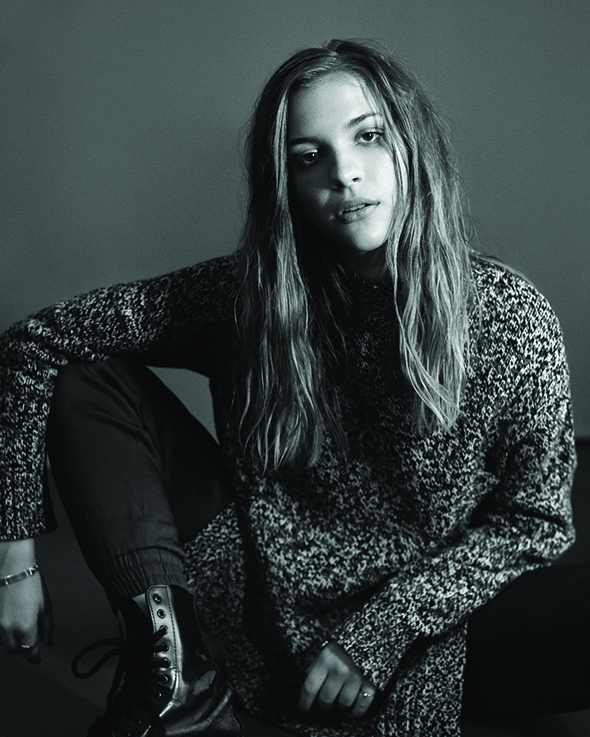
It’s a packed house at the downtown San Francisco venue Rickshaw Stop. Red curtains line the walls and the psychedelic screened backdrops with intriguing scenes from London’s swinging sixties set the tone for the room and the acts in between each set. The audience waits in anticipation for the Swedish electropop cosmopolitan Tove Styrke. Photographer Breno Aragon and I manage to make our way backstage where Tove and her team are relaxing before her performance. Drinks and conversation about international travel experiences are fresh on the tongue. This is Tove’s second show in the U.S.; her first was just a day earlier in Los Angeles. Tove’s style of space age electropop, accompanied with her piercing vocals, merged with a nexus of lyrical and visual sassiness, are just a few descriptions that summarize “Borderline”, a track on her debut album, Kiddo, which will be released in the spring of 2015 via RCA records. This will be her first U.S album release. Despite Tove’s busy schedule, SOMA got a chance to sit down with her to chat about her experiences with RCA, her sound, and the creative process for this upcoming album.
Your style and sound have been referred to as unique and edgy. One review even described your sound as possess- ing a certain “space age swagger”. Can you tell us about the inspiration behind your upcoming album?
One of my biggest Inspirations is Kathleen Hanna from Bikini Kill. She has that sort of aggression and that energy that I think is very empowering. I’m also inspired by different films. Kill Bill played a huge part in the creative process in the beginning. Her character and the giddiness of that movie is something that really inspires me.
What was the creative process like for you with this new album?
It’s been very organic. I’ve had the chance to work with people I really enjoy. Most of them I’ve known since way back. I write so much of the material myself and I like collecting words, themes and phrases. So when I team up with someone I have a collec- tion that I can choose from.
How would you describe Sweden’s music scene?
There’s a community In Sweden and it’s very tight. Sweden is a small country and people just know each other and collaborate, but also help one another, which I feel Is a very healthy thing. That process helps music to thrive.
How does it feel being signed and working with RCA?
So far I really like them. I mean this as a really good thing. They sort of feel like an indie label but they have the muscle. The vibe is very good there and everyone is very engaged in the whole project, which makes it fun.
What are your thoughts on performing for the first time In the U.S.?
I’m really looking forward to com[ing] here more often and play, get the chance to meet new people and see the country. I’m planning on coming back very soon.
Aesthetically, what kind of vibe do you hope to put out for your upcoming album?
Musically and visually I have this very sincere love with pop music. I think Beyoncé is the best; she’s such a queen. I would say it’s very diverse and playful. There’s definitely a bunch of electronic elements and textures worked into the album. Some of the themes are totally fictional. Like my song “Samurai Boy”, it’s about saving a samurai boy that’s not particularly good at being a samurai. He needs to be watched over.
Your sound and visuals are very dynamic and enthralling. Can you tell us a little about the sounds and visuals for this album?`
With the sounds and visuals I just try to enhance the themes and what the songs are about. My music is very personal to me, and I’m just trying to make each song as clear as I can and from my point of view.
Is there any one track in particular that you’re most excited about?
I like “Borderline” a lot. I like the little flirt with reggae. To me it’s like a fighting song about that anger and frustration about gender inequality and that feeling of not being totally in control of my life because I’m a girl and that sort of works kind of well with the influence from that genre, like a protest song.
Text by William Lankford
Photography by Breno Aragon